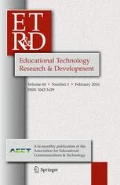Abstract
Project-based learning places demands on learners and instructors that challenge the traditional practices and support structures of schools. Learning from doing complex, challenging, and authentic projects requires resourcefulness and planning by the student, new forms of knowledge representation in school, expanded mechanisms for collaboration and communication, and support for reflection and authentic assessment. This article describes a computer-mediated learning-support system designed as a suite of integrated, internet-based client-server tools to provide (a) intelligent support both for the processes of doing a project and for learning from doing a project, and (b) a shared dynamic knowledge base for working and learning in a community supporting project-based education. The article describes the architecture of the system, its current state of development, and findings from an initial deployment. This articulation of the system components and findings can benefit several groups. It can help (a) educators envisioning the role of technology in augmenting authentic forms of learning, (b) developers of other support systems as they compare features and implications, and (c) researchers as they frame questions about human-computer interactions in learning systems.
Similar content being viewed by others
References
Blumenfeld, P.C., Soloway, E., Marx, R.W., Krajcik, J.S., Guzdial, M., & Palincsar, A. (1991). Motivating project-based learning: Sustaining the doing, supporting the learning.Educational Psychologist, 26(3 & 4), 369–398.
Brown, J.S., Collins, A., & Duguid, P. (1989). Situated cognition and the culture of learning.Educational Researcher, Jan.–Feb., 32–42.
Burton, R., Brown, J.S., & Fischer, G. (1984). Skiing as a model of instruction. In B. Rogoff & J. Lave (Eds.),Everyday cognition: Its development in social context (pp. 139–150). Cambridge, MA: Harvard University Press.
Collins, A. (1996). Design issues for learning environments. In S. Vosniadou, E. De Corte, R. Glaser, & H. Mandl (Eds.),International perspectives on the design of technology supported learning environments (pp. 347–362). Hillsdale, NJ: Lawrence Erlbaum Associates.
Collins, A., & Brown, J.S. (1988). The computer as a tool for learning through reflection. In H. Mandl & A. Lesgold (Eds.),Learning issues for intelligent tutoring systems (pp. 1–18). New York: Springer-Verlag.
Collins, A., Brown, J.S., & Newman, S.E. (1989). Cognitive apprenticeship: Teaching the crafts of reading, writing, and mathematics. In L.B. Resnick (Ed.),Knowing, learning, and instruction: Essays in honor of Robert Glasser (pp. 453–494). Hillsdale, NJ: Lawrence Erlbaum & Associates, Inc.
Dewey, J. (1933).How we think: A restatement of the relation of thinking to the educative process. Boston: Heath.
Dewey, J. (1938).Experience and education. New York: Macmillan.
Geertz, C. (1983).Local knowledge. New York: Basic Books.
Gery, G. (1991).Electronic performance support systems. Boston: Weingarten.
Hawkins, J. (1995). Supporting teachers in changing roles. A group paper from the NSF Educational Technology Workshop.Setting an agenda for computer science in educational technology (pp.23–31). Washington, D.C.: Computing Research Association.
Jackson, S.L., Stratford, S.J., Krajcik, J., & Soloway, E. (1995). A learner-centered tool for students building models.Communications of the ACM, 39(4), 48–49.
Krajcik, J., Blumenfeld, P., Marx, R., & Soloway, E. (1994). A collaborative model for helping middle grade science teachers learn project-based instruction.The Elementary School Journal, 94(5), 483–497.
Laffey, J. (1995a) Project MOST: Building a new educational community to support project-based learning using the internet.Proceedings of AACE World Conference on Education Multimedia and Hypermedia. Association for the Advancement of Computing in Education.
Laffey, J. (1995b). Dynamism in electronic performance support systems.Performance Improvement Quarterly, 8(1), 31–46.
National Research Council, (1996).National Science Educational Standards. Washington, D.C.: National Academy Press.
Norman (1993).Things that make us smart: Defending human attributes in the age of the machine. Reading, MA: Addison-Wesley Publishing Company.
Perkins, D.N. (1993). Person-plus: A distributed view of thinking and learning. In G. Salomon (Ed.),Distributed cognitions: Psychological and educational considerations (pp. 88–110). Cambridge, MA: Cambridge University Press.
Resnick, L.B. (1987). Learning in school and out.Educational Researcher, 16(9), 13–20.
Scardamalia, M., Bereiter, C., & Steinbach, R. (1984). Teachability of reflective processes in written composition.Cognitive Science, 8, 173–190.
Schön, Donald (1983).The reflective practitioner: How professionals think in action. New York: Basic Books.
Spitulnik, J., Struder, S., Finkel, E., Gustafson, E., Laczko, J., & Soloway, 1995.Toward supporting learners participating in scientifically-informed community discourse. Paper presented at the Computer Support for Collaborative Learning Conference, Bloomington, IN: Indiana University. October 1995.
Vygotsky, L.S. (1978).Mind in society: The development of higher psychological processes. Cambridge MA: Cambridge University Press.
Wiggins, G.P. (1993). Assessment: Authenticity, context, and validity.Phi Delta Kappan, November, 200–214.
Author information
Authors and Affiliations
Corresponding author
Rights and permissions
About this article
Cite this article
Laffey, J., Tupper, T., Musser, D. et al. A computer-mediated support system for project-based learning. ETR&D 46, 73–86 (1998). https://doi.org/10.1007/BF02299830
Issue Date:
DOI: https://doi.org/10.1007/BF02299830




